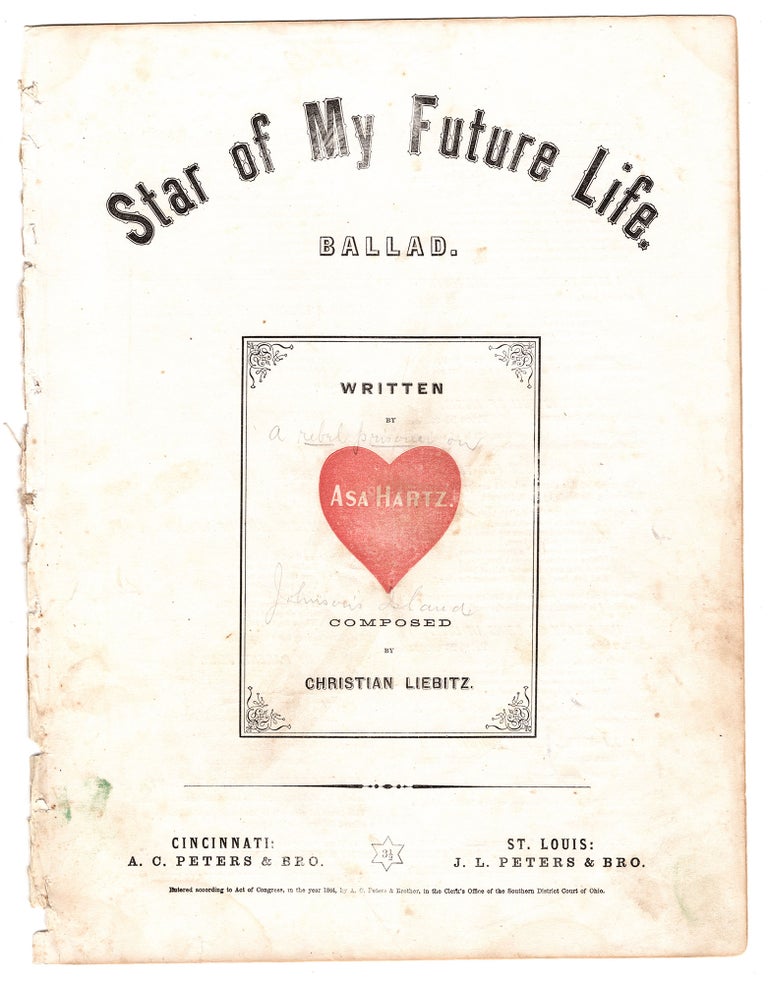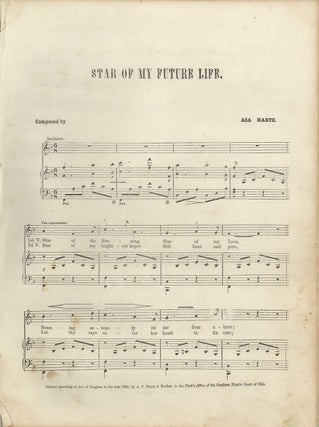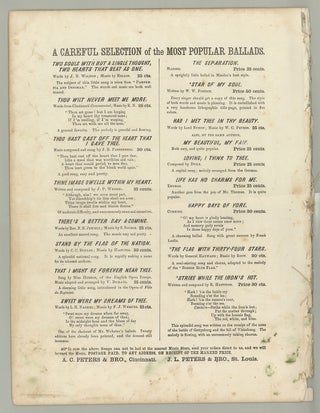Star of My Future Life. Ballad.
Cincinnati, Ohio: A. C. Peters & Bro.; St. Louis, Missouri: J. L. Peters & Bro., 1864. 4to (13.4” x 10.25”), self wrappers. 5, [1], pp. With early pencil inscription on title page reading “A rebel prisoner on Johnson’s Island.” CONDITION: Good, moderate scuffing and light green stains to wrappers, fading to red heart on front-wrapper, some chipping and minor losses to edges of the binding, a few stains throughout, a few light stains to page two, several .5” tears along margins. Exceedingly scarce sheet-music ballad composed by a Confederate officer, thespian, and newspaper man, under the alias Asa Hartz while he was imprisoned at Johnson’s Island, Lake Erie. Asa Hartz was the pen-name of Major George McKnight (1833–1869), who was born in South Carolina. McKnight learned the printing business at a young age, and at eighteen years-old moved to Alabama and then in 1860 to New Orleans, where he worked as an editor of the New Orleans Delta. In 1862, he was appointed a Major in the Confederate Army. Upon the capture of New Orleans (April–May 1862), he escaped the city and was subsequently assigned to duty as Assistant Adjutant General of Maj. Gen. William W. Loring’s division. After taking part in a number of battles, McKnight was captured near Hazlehurst, Mississippi on 19 June 1863. Imprisoned at Johnson’s Island in Ohio, he remained there for over a year, then was apparently released in November of 1864 or thereabouts. While imprisoned, he wrote and produced several comedies and is known to have performed with the “Rebel Thespians,” who invited prisoners as well as citizens living in nearby Sandusky, Ohio to attend their performances. McKnight’s play “The Battle of Gettysburg” was performed multiple times in the prison, and his poetry appeared in southern newspapers. In 1864, he placed a humorous ad in the New York News for “A substitute to stay here in my place” on Johnson’s Island who, he stipulates, must be over thirty years-old, “not [be] addicted to writing poetry,” and have “A-1 digestive powers.” In return, he offers the advantages “of a strict retirement, army rations, and unmitigated watchfulness to prevent him from getting lost…for an indefinite period.” Providing his prison address, he encourages interested parties to contact him “at any time for the next three years.” After the war, he worked for the New Orleans Picayune and died in New Orleans. Prior to the war McKnight married his first wife, Miss Woodal of Georgia. In May of 1863, just before his capture, she was killed by Union soldiers at Jackson, Mississippi. Some of McKnight’s recorded poems concern her as well as other women. In 1865, McKnight married Isabel B. Taylor of Richmond, Virginia, whom he met in South Carolina some time during the war while she was nursing the sick and wounded, and who may be the addressee of the present song. The lyrics read in part: Star of the Evening, Star of the Love, This ballad is set to music composed by Christian Liebitz, which may be an alias, as OCLC does not record any other music composed by Liebitz. The air to which the lyrics are set is likely a ubiquitous, anonymous or traditional tune. Two pages of ads feature a selection of “the most popular ballads” for sale by both A. C. Peters & Bro. of Cincinnati and J. L. Peters & Bro. of St. Louis, some of which are Civil War-themed: “The Old Veteran”; “Stand by the Flag of the Nation” (“A splendid national song”); “Strike While the Iron’s Hot” (“This splendid song was written on the receipt of the news of Gettysburg and the fall of Vicksburg”); and “The Flag with Thirty-Four Stars” (“A soul-stirring song and chorus, adapted to the melody of ‘Bonnie Blue Flag’”). The Johnson’s Island prison, which operated between April 1862 and September 1865, combined its secure island location with proximity to various important Ohio cities and transportation lines. It held up to 3,000 prisoners at a time, and an estimated total of 10,000 over the course of the war. Conditions at Johnon’s Island were better than at most other Confederate and Union military prisons. Still, approximately 300 died during their imprisonment. OCLC records just one example, at Johns Hopkins University. Rare sheet-music by a colorful Confederate prisoner. REFERENCES: Jones, Buehring H., editor. The Sunny Land: Or, Prison Prose and Poetry, Containing the Production of the Ablest Writers in the South, and Prison Lays of Distinguished Confederate Officers (U.S.: Innes, printers, 1868), p. 310; The LaFayette Sun (LaFayette, Alabama 19 Nov. 1884), p. 4; New York News reprinted in the Alexandria Gazette (Alexandria, Virginia, 13 August 1864), p. 2; “Johnson's Island” at Ohio History Central online.
Beaming serenely on me from above;
Fondly I gaze on thee shining afar
And think of my loved one, my beautiful star.
And think of my loved one, my beautiful star.
Star of my best beloved, Comely and bright,
Say, does she gaze on thee Sadly tonight?
And so the teardrops Of love in her eyes
Reflect back thy brightness Dear gem of the skies?
Reflect back thy brightness Dear gem of the Skies.
Item #7502
Sold




